Evaluate Implications of Legal Pressure for Ethical Behavior
VerifiedAdded on 2020/04/07
|5
|1298
|97
Essay
AI Summary
This essay examines the implications of legal pressure on ethical behavior within organizations, using the Galleon Group scandal as a key case study. The essay explores how the legal framework, particularly regulations like the U.S. SEC 1934 act, influences ethical decision-making and the consequences of unethical practices, such as insider trading. It highlights how legal pressures serve to promote accountability and responsibility within organizations, protecting stakeholders and investors from fraudulent activities. The essay emphasizes the importance of ethical frameworks, strong leadership, and compliance programs in preventing legal pitfalls and maintaining organizational integrity. The Galleon Group's failures, including the misuse of non-public information, resulted in severe penalties and the company's downfall, underscoring the critical role of ethics in business operations and the legal repercussions of misconduct. The essay concludes by emphasizing that ethical and legal frameworks are essential for organizational success and the protection of stakeholders.
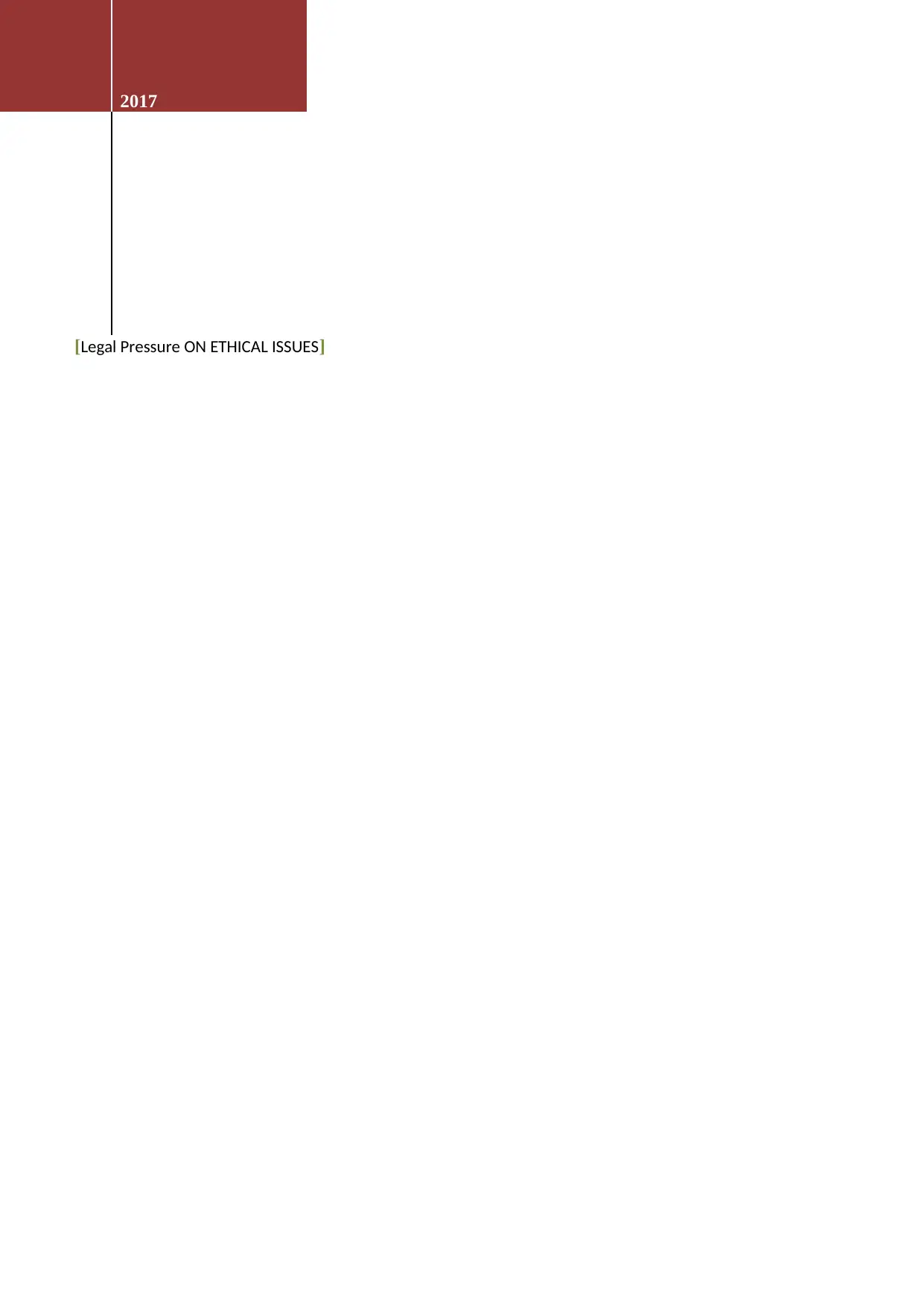
[Legal Pressure ON ETHICAL ISSUES]
2017
2017
Paraphrase This Document
Need a fresh take? Get an instant paraphrase of this document with our AI Paraphraser
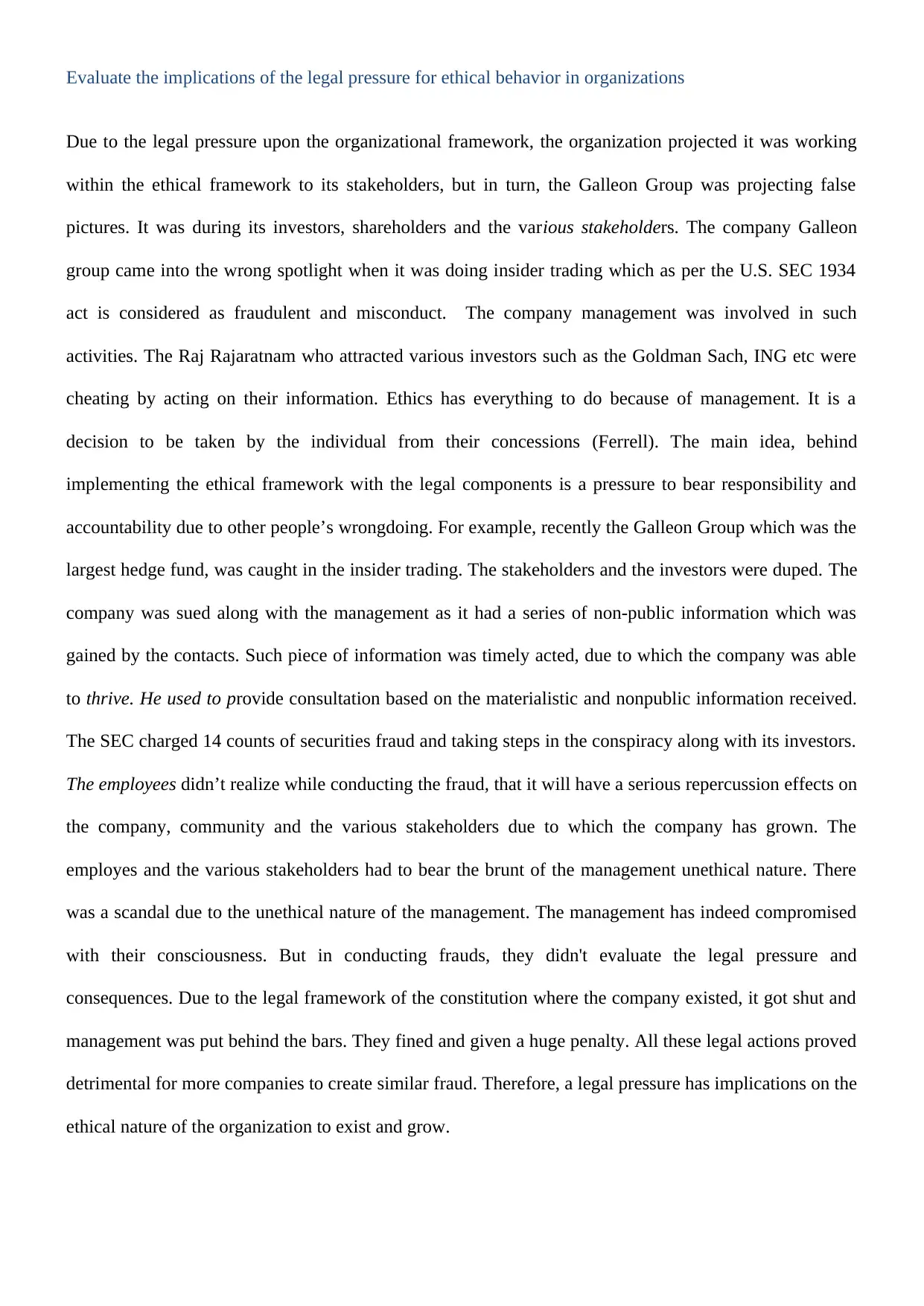
Evaluate the implications of the legal pressure for ethical behavior in organizations
Due to the legal pressure upon the organizational framework, the organization projected it was working
within the ethical framework to its stakeholders, but in turn, the Galleon Group was projecting false
pictures. It was during its investors, shareholders and the various stakeholders. The company Galleon
group came into the wrong spotlight when it was doing insider trading which as per the U.S. SEC 1934
act is considered as fraudulent and misconduct. The company management was involved in such
activities. The Raj Rajaratnam who attracted various investors such as the Goldman Sach, ING etc were
cheating by acting on their information. Ethics has everything to do because of management. It is a
decision to be taken by the individual from their concessions (Ferrell). The main idea, behind
implementing the ethical framework with the legal components is a pressure to bear responsibility and
accountability due to other people’s wrongdoing. For example, recently the Galleon Group which was the
largest hedge fund, was caught in the insider trading. The stakeholders and the investors were duped. The
company was sued along with the management as it had a series of non-public information which was
gained by the contacts. Such piece of information was timely acted, due to which the company was able
to thrive. He used to provide consultation based on the materialistic and nonpublic information received.
The SEC charged 14 counts of securities fraud and taking steps in the conspiracy along with its investors.
The employees didn’t realize while conducting the fraud, that it will have a serious repercussion effects on
the company, community and the various stakeholders due to which the company has grown. The
employes and the various stakeholders had to bear the brunt of the management unethical nature. There
was a scandal due to the unethical nature of the management. The management has indeed compromised
with their consciousness. But in conducting frauds, they didn't evaluate the legal pressure and
consequences. Due to the legal framework of the constitution where the company existed, it got shut and
management was put behind the bars. They fined and given a huge penalty. All these legal actions proved
detrimental for more companies to create similar fraud. Therefore, a legal pressure has implications on the
ethical nature of the organization to exist and grow.
Due to the legal pressure upon the organizational framework, the organization projected it was working
within the ethical framework to its stakeholders, but in turn, the Galleon Group was projecting false
pictures. It was during its investors, shareholders and the various stakeholders. The company Galleon
group came into the wrong spotlight when it was doing insider trading which as per the U.S. SEC 1934
act is considered as fraudulent and misconduct. The company management was involved in such
activities. The Raj Rajaratnam who attracted various investors such as the Goldman Sach, ING etc were
cheating by acting on their information. Ethics has everything to do because of management. It is a
decision to be taken by the individual from their concessions (Ferrell). The main idea, behind
implementing the ethical framework with the legal components is a pressure to bear responsibility and
accountability due to other people’s wrongdoing. For example, recently the Galleon Group which was the
largest hedge fund, was caught in the insider trading. The stakeholders and the investors were duped. The
company was sued along with the management as it had a series of non-public information which was
gained by the contacts. Such piece of information was timely acted, due to which the company was able
to thrive. He used to provide consultation based on the materialistic and nonpublic information received.
The SEC charged 14 counts of securities fraud and taking steps in the conspiracy along with its investors.
The employees didn’t realize while conducting the fraud, that it will have a serious repercussion effects on
the company, community and the various stakeholders due to which the company has grown. The
employes and the various stakeholders had to bear the brunt of the management unethical nature. There
was a scandal due to the unethical nature of the management. The management has indeed compromised
with their consciousness. But in conducting frauds, they didn't evaluate the legal pressure and
consequences. Due to the legal framework of the constitution where the company existed, it got shut and
management was put behind the bars. They fined and given a huge penalty. All these legal actions proved
detrimental for more companies to create similar fraud. Therefore, a legal pressure has implications on the
ethical nature of the organization to exist and grow.
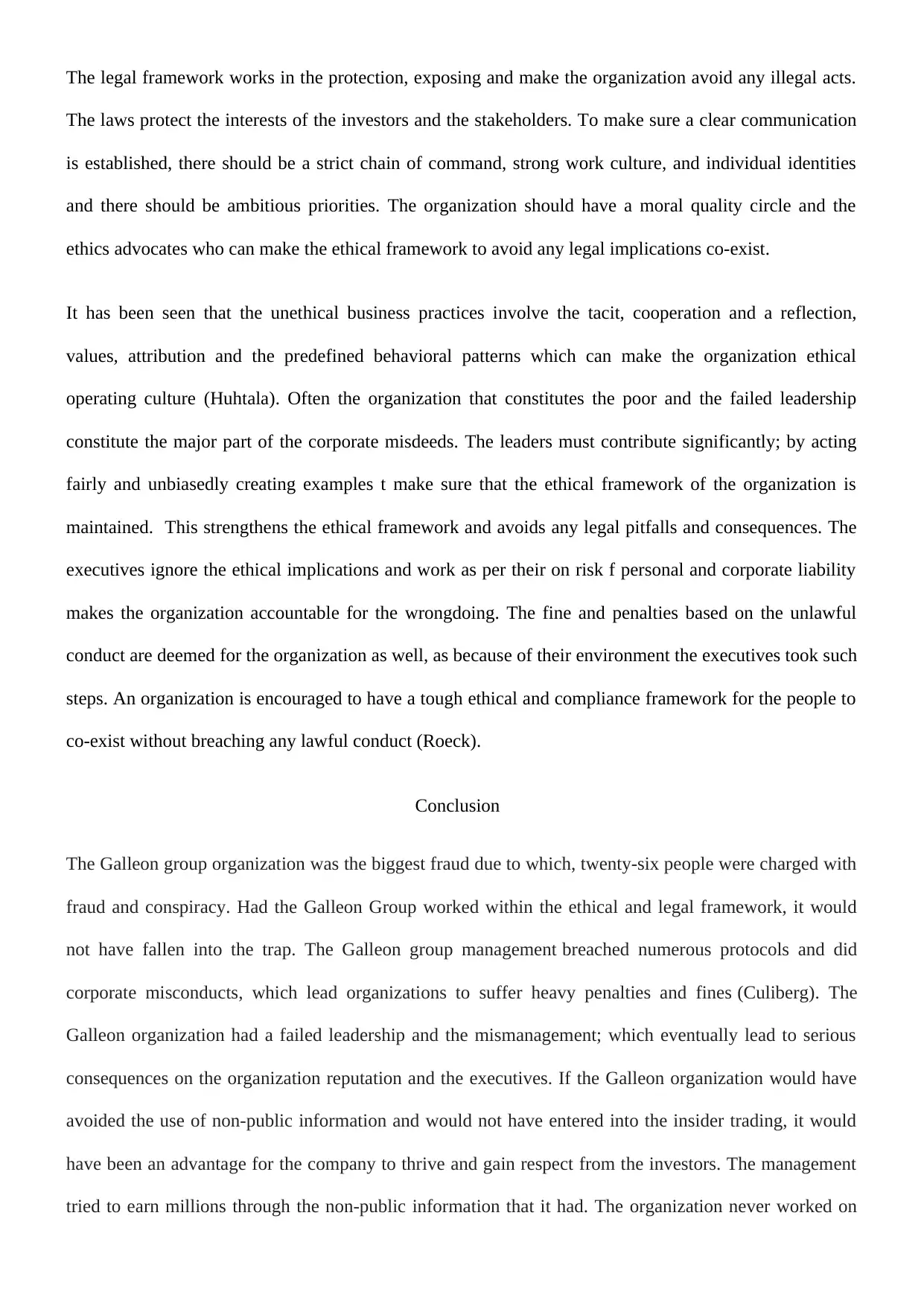
The legal framework works in the protection, exposing and make the organization avoid any illegal acts.
The laws protect the interests of the investors and the stakeholders. To make sure a clear communication
is established, there should be a strict chain of command, strong work culture, and individual identities
and there should be ambitious priorities. The organization should have a moral quality circle and the
ethics advocates who can make the ethical framework to avoid any legal implications co-exist.
It has been seen that the unethical business practices involve the tacit, cooperation and a reflection,
values, attribution and the predefined behavioral patterns which can make the organization ethical
operating culture (Huhtala). Often the organization that constitutes the poor and the failed leadership
constitute the major part of the corporate misdeeds. The leaders must contribute significantly; by acting
fairly and unbiasedly creating examples t make sure that the ethical framework of the organization is
maintained. This strengthens the ethical framework and avoids any legal pitfalls and consequences. The
executives ignore the ethical implications and work as per their on risk f personal and corporate liability
makes the organization accountable for the wrongdoing. The fine and penalties based on the unlawful
conduct are deemed for the organization as well, as because of their environment the executives took such
steps. An organization is encouraged to have a tough ethical and compliance framework for the people to
co-exist without breaching any lawful conduct (Roeck).
Conclusion
The Galleon group organization was the biggest fraud due to which, twenty-six people were charged with
fraud and conspiracy. Had the Galleon Group worked within the ethical and legal framework, it would
not have fallen into the trap. The Galleon group management breached numerous protocols and did
corporate misconducts, which lead organizations to suffer heavy penalties and fines (Culiberg). The
Galleon organization had a failed leadership and the mismanagement; which eventually lead to serious
consequences on the organization reputation and the executives. If the Galleon organization would have
avoided the use of non-public information and would not have entered into the insider trading, it would
have been an advantage for the company to thrive and gain respect from the investors. The management
tried to earn millions through the non-public information that it had. The organization never worked on
The laws protect the interests of the investors and the stakeholders. To make sure a clear communication
is established, there should be a strict chain of command, strong work culture, and individual identities
and there should be ambitious priorities. The organization should have a moral quality circle and the
ethics advocates who can make the ethical framework to avoid any legal implications co-exist.
It has been seen that the unethical business practices involve the tacit, cooperation and a reflection,
values, attribution and the predefined behavioral patterns which can make the organization ethical
operating culture (Huhtala). Often the organization that constitutes the poor and the failed leadership
constitute the major part of the corporate misdeeds. The leaders must contribute significantly; by acting
fairly and unbiasedly creating examples t make sure that the ethical framework of the organization is
maintained. This strengthens the ethical framework and avoids any legal pitfalls and consequences. The
executives ignore the ethical implications and work as per their on risk f personal and corporate liability
makes the organization accountable for the wrongdoing. The fine and penalties based on the unlawful
conduct are deemed for the organization as well, as because of their environment the executives took such
steps. An organization is encouraged to have a tough ethical and compliance framework for the people to
co-exist without breaching any lawful conduct (Roeck).
Conclusion
The Galleon group organization was the biggest fraud due to which, twenty-six people were charged with
fraud and conspiracy. Had the Galleon Group worked within the ethical and legal framework, it would
not have fallen into the trap. The Galleon group management breached numerous protocols and did
corporate misconducts, which lead organizations to suffer heavy penalties and fines (Culiberg). The
Galleon organization had a failed leadership and the mismanagement; which eventually lead to serious
consequences on the organization reputation and the executives. If the Galleon organization would have
avoided the use of non-public information and would not have entered into the insider trading, it would
have been an advantage for the company to thrive and gain respect from the investors. The management
tried to earn millions through the non-public information that it had. The organization never worked on
⊘ This is a preview!⊘
Do you want full access?
Subscribe today to unlock all pages.

Trusted by 1+ million students worldwide
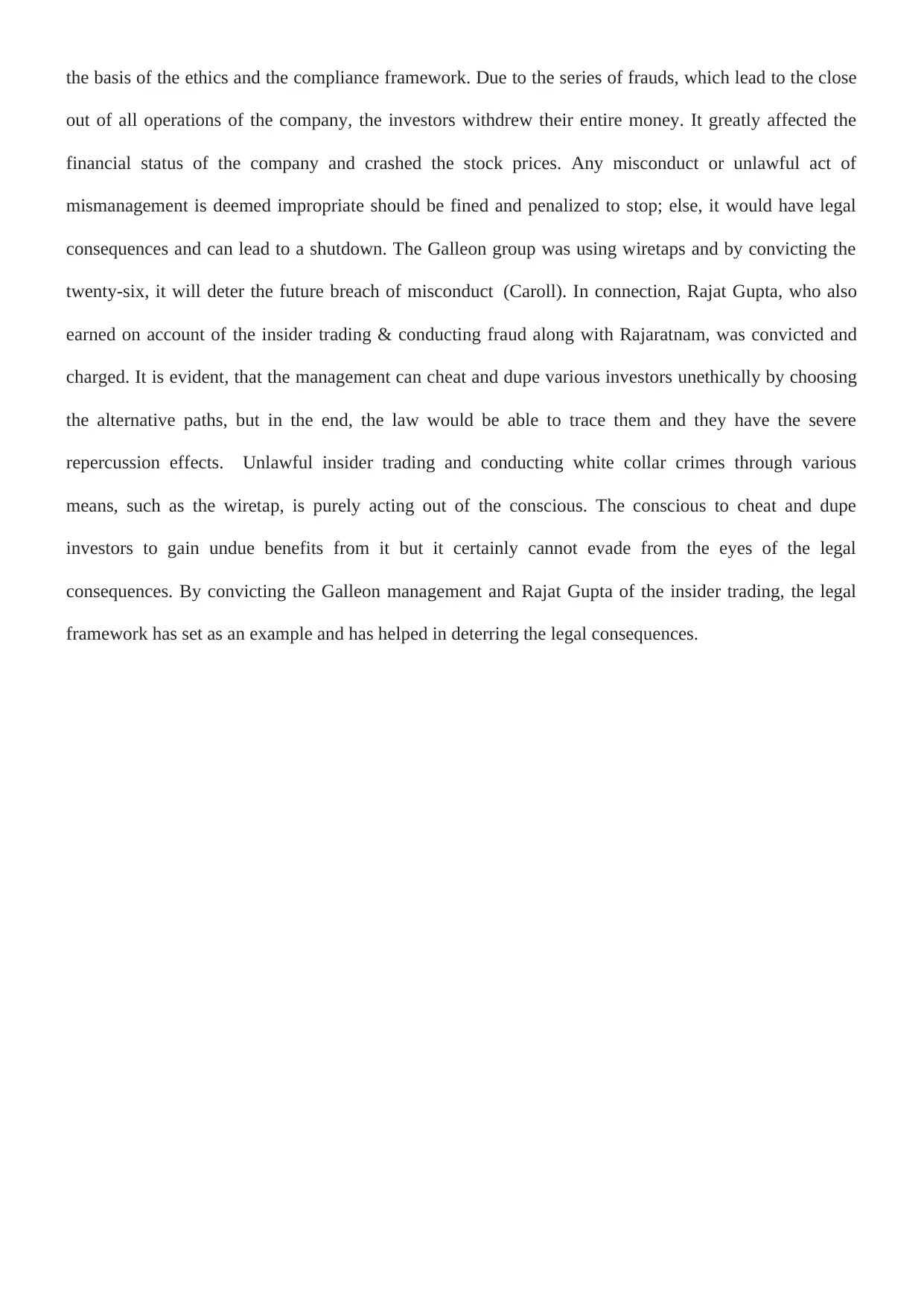
the basis of the ethics and the compliance framework. Due to the series of frauds, which lead to the close
out of all operations of the company, the investors withdrew their entire money. It greatly affected the
financial status of the company and crashed the stock prices. Any misconduct or unlawful act of
mismanagement is deemed impropriate should be fined and penalized to stop; else, it would have legal
consequences and can lead to a shutdown. The Galleon group was using wiretaps and by convicting the
twenty-six, it will deter the future breach of misconduct (Caroll). In connection, Rajat Gupta, who also
earned on account of the insider trading & conducting fraud along with Rajaratnam, was convicted and
charged. It is evident, that the management can cheat and dupe various investors unethically by choosing
the alternative paths, but in the end, the law would be able to trace them and they have the severe
repercussion effects. Unlawful insider trading and conducting white collar crimes through various
means, such as the wiretap, is purely acting out of the conscious. The conscious to cheat and dupe
investors to gain undue benefits from it but it certainly cannot evade from the eyes of the legal
consequences. By convicting the Galleon management and Rajat Gupta of the insider trading, the legal
framework has set as an example and has helped in deterring the legal consequences.
out of all operations of the company, the investors withdrew their entire money. It greatly affected the
financial status of the company and crashed the stock prices. Any misconduct or unlawful act of
mismanagement is deemed impropriate should be fined and penalized to stop; else, it would have legal
consequences and can lead to a shutdown. The Galleon group was using wiretaps and by convicting the
twenty-six, it will deter the future breach of misconduct (Caroll). In connection, Rajat Gupta, who also
earned on account of the insider trading & conducting fraud along with Rajaratnam, was convicted and
charged. It is evident, that the management can cheat and dupe various investors unethically by choosing
the alternative paths, but in the end, the law would be able to trace them and they have the severe
repercussion effects. Unlawful insider trading and conducting white collar crimes through various
means, such as the wiretap, is purely acting out of the conscious. The conscious to cheat and dupe
investors to gain undue benefits from it but it certainly cannot evade from the eyes of the legal
consequences. By convicting the Galleon management and Rajat Gupta of the insider trading, the legal
framework has set as an example and has helped in deterring the legal consequences.
Paraphrase This Document
Need a fresh take? Get an instant paraphrase of this document with our AI Paraphraser
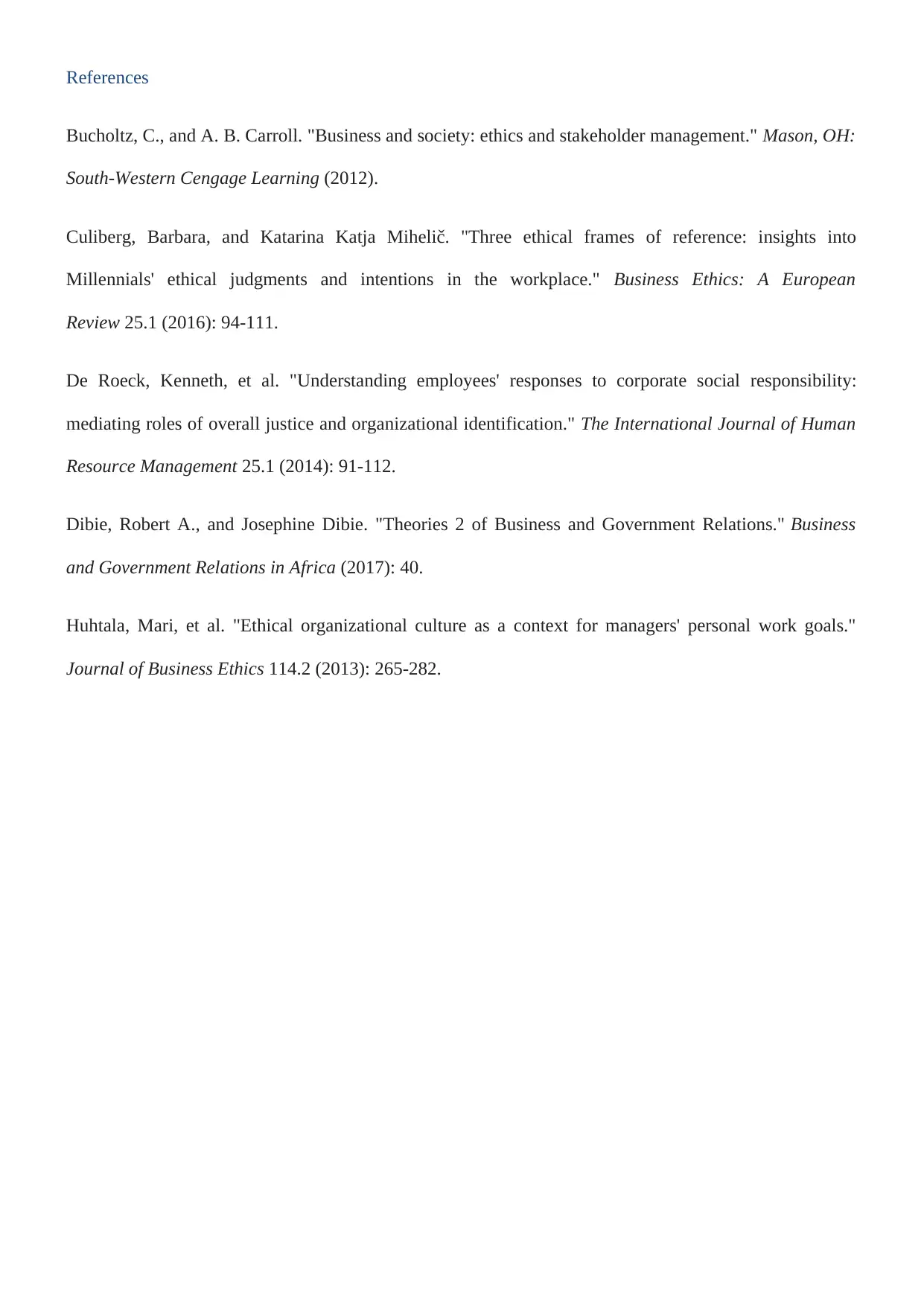
References
Bucholtz, C., and A. B. Carroll. "Business and society: ethics and stakeholder management." Mason, OH:
South-Western Cengage Learning (2012).
Culiberg, Barbara, and Katarina Katja Mihelič. "Three ethical frames of reference: insights into
Millennials' ethical judgments and intentions in the workplace." Business Ethics: A European
Review 25.1 (2016): 94-111.
De Roeck, Kenneth, et al. "Understanding employees' responses to corporate social responsibility:
mediating roles of overall justice and organizational identification." The International Journal of Human
Resource Management 25.1 (2014): 91-112.
Dibie, Robert A., and Josephine Dibie. "Theories 2 of Business and Government Relations." Business
and Government Relations in Africa (2017): 40.
Huhtala, Mari, et al. "Ethical organizational culture as a context for managers' personal work goals."
Journal of Business Ethics 114.2 (2013): 265-282.
Bucholtz, C., and A. B. Carroll. "Business and society: ethics and stakeholder management." Mason, OH:
South-Western Cengage Learning (2012).
Culiberg, Barbara, and Katarina Katja Mihelič. "Three ethical frames of reference: insights into
Millennials' ethical judgments and intentions in the workplace." Business Ethics: A European
Review 25.1 (2016): 94-111.
De Roeck, Kenneth, et al. "Understanding employees' responses to corporate social responsibility:
mediating roles of overall justice and organizational identification." The International Journal of Human
Resource Management 25.1 (2014): 91-112.
Dibie, Robert A., and Josephine Dibie. "Theories 2 of Business and Government Relations." Business
and Government Relations in Africa (2017): 40.
Huhtala, Mari, et al. "Ethical organizational culture as a context for managers' personal work goals."
Journal of Business Ethics 114.2 (2013): 265-282.
1 out of 5
Related Documents
Your All-in-One AI-Powered Toolkit for Academic Success.
+13062052269
info@desklib.com
Available 24*7 on WhatsApp / Email
![[object Object]](/_next/static/media/star-bottom.7253800d.svg)
Unlock your academic potential
Copyright © 2020–2026 A2Z Services. All Rights Reserved. Developed and managed by ZUCOL.





